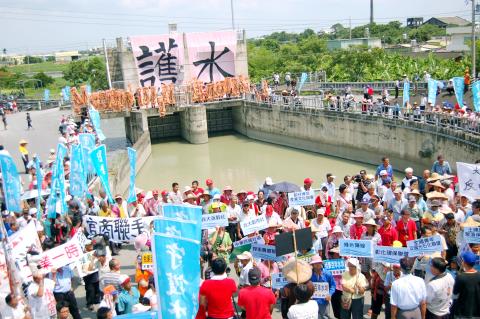Standing in front of a giant banner hanging from a water gate and emblazoned with the words “protect the water,” hundreds of farmers and farmers’ rights activists yesterday protested at the source of an irrigation channel in Changhua County’s Sijhou Township (溪州) over the Central Taiwan Science Park’s (CTSP) plans to divert water from the irrigation system.
“Water is already scarce and [the Changhua County Irrigation Association] only supplies water through irrigation channels four out of every 10 days,” Hsieh Pao-yuan (謝寶元), a farmer and president of the Alliance Against Water-Jacking by the CTSP, told the crowd. “With the CTSP planning to take more water from the irrigation channel, we Chang-hua farmers are going to be left with nothing — that is why we have to stand united and protect the water.”
Hsieh’s remarks drew a round of applause and cheers.

Photo: Liu Hsiao-hsin, Taipei Times
The farmers are worried because the association plans to build an underground aqueduct to supply more than 65,000 tonnes of water from the main Cizaipijun (莿仔埤圳) aqueduct to the latest campus in Erlin Township (二林).
The water in Cizaipijun comes from the Jhuoshui River (濁水溪) and is controlled by the water gate where yesterday’s rally was held.
Hsieh and other farmers are worried that the park’s diversion of the water could have a huge impact on farming families that depend on the irrigation channel to make a living.
“The Cizaipijun irrigation system supplies water to 180,000 hectares of farmland in southern Changhua County, including Sijhou, Erlin, Jhutang [竹塘], Dacheng [大城] and Fangyuan [芳苑] townships, which feed more than 30,000 farming families or more than 100,000 people,” Hsieh said. “The park said it would hire tens of thousands of people locally, but do they plan to feed so many people?”
The participants then performed a rite of worship to the river god, praying for him to protect the water.
Farming activist Yang Ju-men (楊儒門) questioned the legality of the plan to divert water from farms to industrial uses.
“Article 18 of the Water Act [水利法] stipulates that the allocation of water should follow the following order: first, family use; second, agricultural use; third, hydroelectric power plant use; and only then industrial and transportation use,” Yang said. “So it’s illegal to divert water from farms to the science park, especially when there is already insufficient water for irrigation.”
Sijhou Mayor Huang Sheng-lu (黃盛祿) accused the Irrigation Association of not informing residents before contracting out the aqueduct project.
He said, although the project was contracted out in December, the association only contacted the township office four months ago to ask if it could provide a venue for a public hearing.
Pointing to earlier comments by President Ma Ying-jeou (馬英九) that “if you care about the agricultural sector, you should not harm the farmers,” Taiwan Rural Front spokeswoman Tsai Pei-hui (蔡培慧) said that the lack of water was the most serious issue for farmers.
“The problem is not how much 1kg of bananas sells for, the real problem is that the government is trying to rob farmers of their land and water,” Tsai said.

Seventy percent of middle and elementary schools now conduct English classes entirely in English, the Ministry of Education said, as it encourages schools nationwide to adopt this practice Minister of Education (MOE) Cheng Ying-yao (鄭英耀) is scheduled to present a report on the government’s bilingual education policy to the Legislative Yuan’s Education and Culture Committee today. The report would outline strategies aimed at expanding access to education, reducing regional disparities and improving talent cultivation. Implementation of bilingual education policies has varied across local governments, occasionally drawing public criticism. For example, some schools have required teachers of non-English subjects to pass English proficiency

‘FORM OF PROTEST’: The German Institute Taipei said it was ‘shocked’ to see Nazi symbolism used in connection with political aims as it condemned the incident Sung Chien-liang (宋建樑), who led efforts to recall Democratic Progressive Party (DPP) Legislator Lee Kun-cheng (李坤城), was released on bail of NT$80,000 yesterday amid an outcry over a Nazi armband he wore to questioning the night before. Sung arrived at the New Taipei City District Prosecutors’ Office for questioning in a recall petition forgery case on Tuesday night wearing a red armband bearing a swastika, carrying a copy of Adolf Hitler’s Mein Kampf and giving a Nazi salute. Sung left the building at 1:15am without the armband and apparently covering the book with a coat. This is a serious international scandal and Chinese

TRADE: The premier pledged safeguards on ‘Made in Taiwan’ labeling, anti-dumping measures and stricter export controls to strengthen its position in trade talks Products labeled “made in Taiwan” must be genuinely made in Taiwan, Premier Cho Jung-tai (卓榮泰) said yesterday, vowing to enforce strict safeguards against “origin laundering” and initiate anti-dumping investigations to prevent China dumping its products in Taiwan. Cho made the remarks in a discussion session with representatives from industries in Kaohsiung. In response to the US government’s recent announcement of “reciprocal” tariffs on its trading partners, President William Lai (賴清德) and Cho last week began a series of consultations with industry leaders nationwide to gather feedback and address concerns. Taiwanese and US officials held a videoconference on Friday evening to discuss the

PERSONAL DATA: The implicated KMT members allegedly compiled their petitions by copying names from party lists without the consent of the people concerned Judicial authorities searched six locations yesterday and questioned six people, including one elderly Chinese Nationalist Party (KMT) member and five KMT Youth League associates, about alleged signature forgery and fraud relating to their recall efforts against two Democratic Progressive Party (DPP) legislators. After launching a probe into alleged signature forgery and related fraud in the KMT’s recall effort, prosecutors received a number of complaints, including about one petition that had 1,748 signatures of voters whose family members said they had already passed away, and also voters who said they did not approve the use of their name, Taipei Deputy Chief Prosecutor